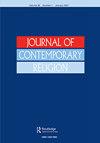去中心化朝圣研究:理解新五旬节派在非洲的旅程和朝圣
IF 0.6
3区 哲学
0 RELIGION
引用次数: 1
摘要
本文旨在通过讨论新五旬节派旅行和朝圣现象如何在非洲出现,来消除朝圣研究领域中被视为理所当然的范畴和经验倾向。五旬节派基督教在非洲的快速增长和发展现在已经广为人知并得到了研究;然而,宗教跨国流通和流动的一些独特模式迄今尚未引起学术界的注意。在过去的十年里,西非已经成为宗教朝圣的五旬节派精神中心,在这里,“教父”们指导来自非洲各地的年轻的、主要是男性的、有抱负的先知们创造“非凡的奇迹”。这里也是政治家、散居者和普通信徒聚集的地方,他们在这里寻求精神重生,摆脱贫困的负担,寻求治愈和预言。这篇文章强调了新五旬节派的旅程和朝圣是基于本土的宗教世界观、泛非联系和非洲人的代理,在一个由暴力和剥削结构以及奴役、殖民主义和新自由主义资本主义的经历所塑造的大陆上。本文章由计算机程序翻译,如有差异,请以英文原文为准。
De-centring pilgrimage studies: understanding neo-Pentecostal journeys and pilgrimage in Africa
ABSTRACT This article aims to de-centre the taken-for-granted categories and empirical tendencies in the field of pilgrimage studies by discussing how the phenomenon of neo-Pentecostal journeys and pilgrimage emerges in Africa. Pentecostal Christianity’s rapid growth and development in Africa are now well-known and researched; however, some distinctive patterns of transnational religious circulation and mobilities have so far escaped academic attention. Over the last decade, West Africa has emerged as a Pentecostal spiritual centre for religious pilgrimage, a space where ‘godfathers’ mentor young, mainly male, aspiring prophets from across Africa to perform ‘extraordinary miracles’. It is also a space where politicians, diasporas, and ordinary believers flock for spiritual rebirth and release from the burden of poverty and the quest for healing and prophecy. This article highlights that the neo-Pentecostal journeys and pilgrimage are grounded in indigenous religious worldviews, Pan-African connections, and Africans’ agency, on a continent shaped by violent and exploitative structures and experiences of enslavement, colonialism, and neoliberal capitalism.
求助全文
通过发布文献求助,成功后即可免费获取论文全文。
去求助
来源期刊

Journal of Contemporary Religion
RELIGION-
CiteScore
1.20
自引率
0.00%
发文量
59
期刊介绍:
Journal of Contemporary Religion is an international peer reviewed journal. Its purpose is to both document and evaluate the anthropological, sociological, psychological, and philosophical aspects of emerging manifestations of religiosity in any part of the world—whether within innovative movements or mainstream institutions. The term ''religion'' in the title of this journal is understood to include contributions on spirituality. Moreover, as the journal title suggests, the focus is on contemporary issues. Therefore, the editors of Journal of Contemporary Religion welcome submissions which deal with: classical topics in the study of religion, such as secularisation and the vitality of religion or traditional sectarian movements; more recent developments in the study of religion, including religion and social problems, religion and the environment, religion and education, the transmission of religion, the materialisation and visualisation of religion in various forms, new forms of religious pluralism, the rise of new forms of religion and spirituality, religion and the Internet, religion and science, religion and globalisation, religion and the economy, etc. theoretical approaches to the study of religion; discussions of methods in relation to empirical research; qualitative and quantitative research and related issues. The Journal includes reviews of books which reflect the above themes.
 求助内容:
求助内容: 应助结果提醒方式:
应助结果提醒方式:


